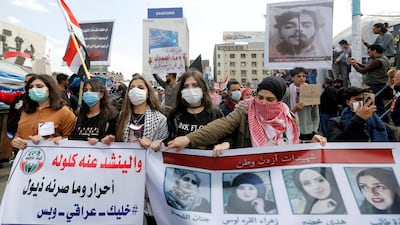Iraq’s political dysfunction has entered a new phase with the prime minister designate failing to form a government. Mohammed Tawfiq Allawi had been named in February as a compromise candidate to form a transitional government. However, he was unable to build the consensus needed to get his Cabinet across the finish line. Baghdad is back to square one, with no prime minister and no clear road map of how to get out of its political rut.
Announcing his inability to form a government, and thus withdrawing his name from the running, Mr Allawi said that he was faced with the possibility of "being prime minister while not being honest with my people and continuing in this position while they suffered…so the choice was simple and clear". It is worth noting that Mr Allawi only withdrew his candidacy after Parliament failed to meet quorum and it was clear that no government could be formed under his leadership.
There are no calls of outrage over Mr Allawi’s withdrawal. The reaction to his nomination was already mixed. Some lauded the fact that he was not a member of any of the discredited political parties and that he was generally not complicit in any of the corruption plaguing the country. Others, including many of the protesters on Iraq's streets, criticised choosing a former member of Parliament and minister who was a member of the political elite that harmed the country in the first place.
Speculation is rife over who will be given the chance to form a Cabinet next – guesses range from former prime minister Adel Abdul Mahdi to the head of the Iraqi intelligence service, Mustafa Al Kadhimi.
Regardless of who the next candidate is, the political process to confirm him (it most certainly will be a man) is in itself problematic. Any candidate named by President Barham Salih has to pass a vote of confidence in Parliament, as mandated by the constitution. This was meant to be a process to ensure good governance and consensus-building. Instead, political blocs have used this constitutional provision as a way to hold the entire process hostage. And they have largely done this by refusing to turn up in Parliament, meaning no quorum is met and thus no decisions can be made.
The irresponsible nature of this behaviour results in Iraqis being left in political limbo as political players meet behind closed doors to jockey over interests and government posts. As a new cycle begins in the search for a candidate, the futility of the political system and its inability to deliver good governance are made even clearer.

The political vacuum in Baghdad comes at a time when government services are much needed, especially with the outbreak of the coronavirus. Not only is a whole-of-government effort needed to stem the spread of the virus, but the drop in oil prices could mean that an economic crisis is just around the corner for Iraq.
Everything from air travel to oil extraction is under threat, especially as China’s CPC is the main international oil company that runs Iraq’s largest oil field, Majnoon. No concerted effort has been made by the caretaker government to quell travel from Iran, where all the cases in Iraq originate from. Nor has it proposed tangible measures to deal with this global health emergency. Three million internally displaced Iraqis, with hundreds of thousands living in tents, are incredibly vulnerable to this disease.
Iraq’s problems are further compounded by a new nonsensical law that enforces a retirement age of 60 years across all government entities. From bank managers to ambassadors, those with the longest years of experience will be forced to step down from their positions from January 1, 2021. The idea behind the decision was ostensibly to give more young Iraqis a chance to get promoted across government entities. In reality, however, the decision is ad hoc and no serious measures were put in place to ensure a proper handover across government sectors.
As Iraq goes into its fourth month under a caretaker government, the country’s political class is proving its ineptitude. Meanwhile, protesters continue to call for tangible change. Their demands are largely unchanged: good governance, ending corruption, and upholding the country’s sovereignty. Despite the killing of more than 600 protesters so far, the kidnapping of dozens and injury of thousands, the protest movement that began last October remains strong.
The latest failure in forming a government has further highlighted the justified complaints of activists. The disagreements were not over a governmental programme, but rather over which political party got which ministerial seat to extend its own patronage. The cracks in the political system are getting deeper, emphasizing the need to overhaul the system in its entirety, rather than just play the usual game of musical chairs in forming a new government.
Mina Al-Oraibi is editor-in-chief of The National


